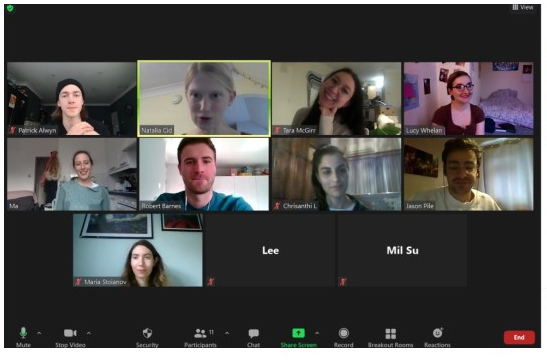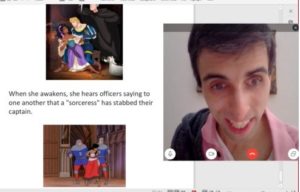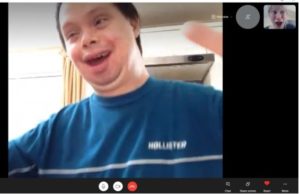News
5 March 2021 / Grants and Awards
Safe Spaces for Online Creativity

image: the Jackson’s Lane group in Zoom session
Nell Hardy received one of our Covid-19 Support grants last year to help her work with people with learning difficulties, creating safe spaces in which young people could find and share their creative and social voices. She writes for us here:
Like so many theatre artists, my working life was turned completely upside down by the pandemic. Shows cancelled with no idea of when they would return, training courses hanging in the balance, even my ‘side-jobs’ running storytelling sessions one-to-one with young adults with learning and other disabilities had to grind to a halt.
I can remember feeling an awful lot more fortunate than most, though. The Tramshed, where I was a resident artist working on my solo show, was committed to rescheduling their commitment to me, and kept in contact via e-mails and video calls about progression. The Young Vic Directors’ Programme, through which I was booked onto a week-long course for early career directors, had been redesigned for delivery over Zoom in no time at all. My one-to-one clients and I found a way to make our sessions work over Skype. I couldn’t make live theatre for a while, but on some level I could still work.
Then my laptop gave out.
I’d have to reboot in the middle of every class I taught. I missed out on whole swathes of workshops in which I took part because of machine malfunctions. I was constantly looking at listings for jobs I couldn’t apply to because I knew my technology wasn’t reliable enough to carry them out from home. I could afford something basic, that would allow me to word process and access the Internet, but no way could I have bought a new machine that was up to the challenges of video conferencing, editing and the other faculties I needed to be able to keep working and adapt to the already near-impossibile task of being a theatre-maker from home. So the STR’s grant couldn’t have come at a more crucial time.
In the first instance, I was relieved for my one-to-one clients. I have worked with neurodiverse and disabled adults in drama group contexts for many years, and those groups are profoundly valuable, but its members inevitably will not get enough individual attention to engage fully in the storytelling that happens in them on the level of comprehension and emotional response. So I take a very individualised approach with my clients to access stories in a way that speaks to them best, that challenges them at their own pace with things they can do for themselves while facilitating for things they cannot, so they can access and express their optimum emotional and intellectual response to the stories on which we work. I have seen this translate to improvements in my clients’ general conversation skills and empathetic awareness, as well as in their social confidence, mood and engagement in the world around them.
It takes time, and the skills built up can break down quickly without regular practice. So the idea of having to halt our work altogether was very disheartening for all of us. The transition to online lessons was challenging, but we managed to find new things in it that could not replace in-person classes, but definitely made good of what we had.
Hooman reads books out loud to me with my help, then I ask him questions about what has happened, why the characters do what they do, and how he feels about them. He needs large print and pictures help him a lot, so often the material we can find is too childish for him.

So I have been tailor making documents for him, then sharing my screen in our sessions, so we can read stories that match his intellect. He is fascinated by Russian history, so for several months we were reading a story I was writing about a Russian peasant family that relocated to St Petersburg at the turn of the twentieth century in the hope of finding a better life. I think I learned as much as he did! And it brought us to conversations about serious social issues that are still relevant today, in a way that enthused him and empowered him. Here he is with our current story: a summary of the novel The Hunchback of Notre Dame. He has really been enjoying reading the original stories on which many of his favourite films are based, and finding out all the extra details that the film-makers leave out.
Jan likes to stretch out at the beginning of our sessions to get the blood flowing to his brain a little! So we have designed a short chair yoga sequence that also tells a story in which we get on a plane to a new place each time. It always puts a smile on his face to decide which friends he is going to visit in which country, and helps him feel a little more connected to the people he has not been able to see for so long.
 Then, I read to him and get him to answer questions about the story, show me the facial expressions he thinks the characters have at various points, and how he thinks they are feeling. At first he wouldn’t use his voice with me at all and ask his mum to ‘translate’ everything he said to me, but he’s getting much happier to chat away! In the picture you can see how we say goodbye to each other at the end of each session: parting is usually a sweet sorrow, so we mix it up and make it as silly as we possibly can!
Then, I read to him and get him to answer questions about the story, show me the facial expressions he thinks the characters have at various points, and how he thinks they are feeling. At first he wouldn’t use his voice with me at all and ask his mum to ‘translate’ everything he said to me, but he’s getting much happier to chat away! In the picture you can see how we say goodbye to each other at the end of each session: parting is usually a sweet sorrow, so we mix it up and make it as silly as we possibly can!
It took a lot longer to figure out how we could reconnect with my young people at Jacksons Lane (see image at top of article), due to the kind of wider organisational restructuring that all theatres had to undergo. I kept in touch with our young people by e-mailing them about any opportunities I saw arise that might be of interest to them, but that was all I could do for a while. We were delighted when we found out they had ring-fenced a little money to allow us to run a short project at the beginning of this year to reconnect with the young people properly, and re-establish the group before we hopefully start up again properly in the new academic year and in Jacksons Lane’s newly refurbished space! It was also great to be able to invite some new young people to participate from where they were all over the country, and welcome back some previous members who have gone on to pastures new.
When we can meet in person I put great emphasis on collaborative devising and ensemble development, encouraging members to find their collective strength as young people in our society and challenge each other to tell the stories they want to tell, share how they see the world with each other, find ways to unify their artistic visions. Without a shared physical space, that instinctual and visceral connection is much altered and some is inevitably lost, so I was eager to make sure that this Zoom project allowed for individual artistic benefit as well as collective ownership and connectedness.
Each participant had an individual meeting with myself and my assistant Leah, in which we discussed where they were in their journey as an artist, what sort of work they have done, what they want to do in the future, and what skills they need to develop or experiments they need to carry out to get to a place where they can pursue their goals. From there, we put them into three smaller groups based on which collaborations we thought would allow each person to realize a personal goal. We left them to it for a while, then met with each group for a facilitated rehearsal in which we helped them hone their ideas into achievable, 10/15-minute piece structures, and advised on working methodologies. This picture is taken from our mid-way work-in-progress showing: it was so impressive to see what the groups had achieved, and how different each piece was! And above all, it was so inspiring to see how eager all of these young people were to connect, to feed off of each other, to find enthusiasm in their peers’ work as well as their own. They have been creatively starved and their relief was palpable.
Now they are all beavering away in advance of the final sharing of their pieces, after which we will check in with them all individually once more to evaluate their process and help them to think about how they can keep building as artists as we come out of lockdown. Our industry is about to find a whole generation of emerging artists ready to hit the ground running!
Besides this, my own career has been enormously helped by having a reliable machine. Zoom auditions and meetings, being able to edit my own showreel and the trailer of the solo show I have been lucky to be able to develop through Arts Council funding over the course of the year, all of these would not have been possible without the STR’s help. It feels extraordinary to be able to say that I have actually made huge forward strides in my career during times like these, but that is what you have facilitated me doing. Thank you so much!
Is there anything that you are currently working on that might be eligible for one of our Research Grants? We welcome applications from all kinds of theatre researchers – academics, practitioners, independent scholars. Closing date for 2021 applications is March 26th.
Full details and application form here.